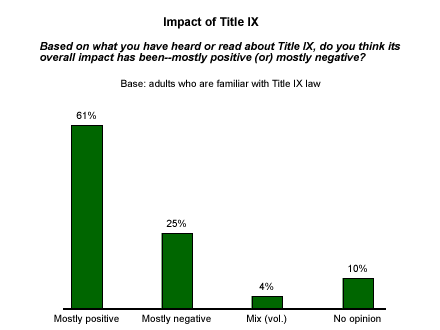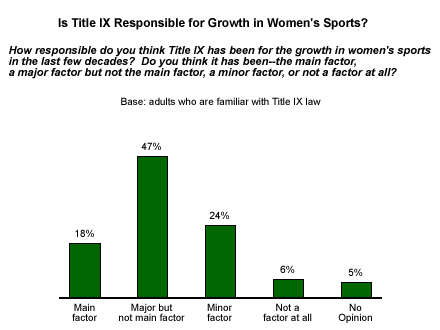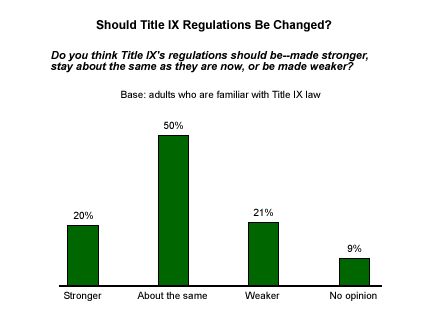During the 2002 U.S. Open, tennis champion Jennifer Capriati was asked what she thought about Title IX, the groundbreaking 1972 law that prohibits schools and other federally funded institutions from discriminating on the basis of sex. Capriati's response? "I have no idea what Title IX is," she said, "Sorry."
It may seem surprising that Capriati, who has earned millions competing in professional sports, would be unfamiliar with the legislation that paved the way for many American girls to succeed as pro athletes. But it turns out that Capriati is not alone in her ignorance of Title IX. When asked in a recent Gallup Poll* how much they have heard about Title IX, 26% of U.S. adults say "not much," and nearly a third (30%) admit to having heard "nothing at all" about it. Only 15% have heard "a great deal," and 28% have heard "a moderate amount."
The History of Title IX
When President Richard Nixon signed Title IX into law 30 years ago, he triggered an explosion in the prevalence of female athletics. According to the U.S. General Accounting Office, fewer than 300,000 girls participated in high school sports in 1971, compared to more than 2.7 million today.
Despite these positive outcomes, Title IX has come under heavy fire in recent years. Many coaches feel that the law unfairly diverts funding toward women's sports teams at the expense of men's teams, which tend to produce far more revenue, and have called for changes in the way that Title IX is enforced. In response to these complaints, the U.S. Department of Education has established a commission (the Secretary's Commission on Opportunity in Athletics) to examine Title IX's effectiveness and determine if the legislation needs to be changed. The commission's report is due next month, and there is widespread speculation that it may recommend that Title IX regulations be weakened.
Public Opinion on Title IX
Although more than half the U.S. population knows very little about Title IX, most of those who are familiar with it feel it is a good thing, and has been a factor in the growth of women's sports. When asked if they think the overall impact of Title IX has been "mostly positive" or "mostly negative," 61% of those familiar with Title IX choose the former option and 25% the latter. When asked how responsible Title IX has been for the growth of women's sports over the past few decades, 18% say it has been "the main factor," 47% say it has been "a major factor, but not the main factor," and 24% feel it has been a minor factor.


Although most who are familiar with the law seem to have generally positive opinions about the effects of Title IX, they have mixed feelings about whether the legislation should be changed. Gallup asked respondents whether they think Title IX regulations should be made stronger, stay the same, or be made weaker. Among those familiar with Title IX, 20% think the regulations should be made stronger, while a nearly equal percentage (21%) feel they should be made weaker. Half (50%) think the regulations should remain the same.

While both men and women familiar with Title IX rate it positively (roughly 6 in 10 of both groups say its impact has been mostly positive), men are more likely than women to want to weaken the law. Twenty-nine percent of males familiar with the law think it should be made weaker, while just 16% think it should be made stronger and 49% believe it should stay as it is now. Compare that to the responses of women who are familiar with Title IX, among whom just 12% say it should be weakened, while 23% would like to see it made stronger and 52% say it should stay the same.
Bottom Line
Forty years ago, young women interested in sports were hard-pressed to find female athletic role models. Athletes such as tennis legend Billie Jean King were the exception, not the rule. But girls today have a wider variety of female role models to choose from, such as soccer star Mia Hamm, tennis phenoms Venus and Serena Williams, and Olympic softball standout Dot Richardson. So although less than half of Americans are familiar with Title IX, many of them (including athletes like Capriati) have felt the effects of Title IX without knowing it.
Among Americans who are familiar with Title IX, most rate it positively but it is unclear what (if anything) they think should be done to improve it. It seems that the Secretary's Commission on Opportunity in Athletics should think carefully about proposing major changes to Title IX -- the commission's decisions will undoubtedly have a major impact on the women of the future.
*Results are based on telephone interviews with 1,000 national adults, aged 18 and older, conducted Jan. 3-5, 2003. For results based on the total sample of national adults, one can say with 95% confidence that the maximum margin of sampling error is ±3%.